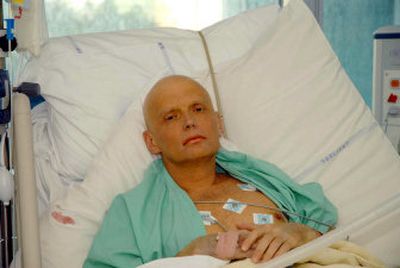Signs of London poisoning shake Russian expatriates

LONDON – Here in Moscow-on-the-Thames, it was a calling card from home.
An ex-KGB agent who has settled in London to raise his family gets a warning that his name is on a Mafia hit list, then falls ill from a mysterious poisoning. Dark theories involving the Kremlin and sinister business figures tumble around town like blini from a hot pan.
Suddenly, the elegant Mayfair townhouses with window-box geraniums and the Chelsea gastro pubs with designer vodka don’t seem so very far from Russia.
The apparent attack on Alexander Litvinenko has reminded London’s 300,000-plus Russian residents that the long, often-menacing arm of Slavic capitalism and politics is only a 3 1/2-hour Aeroflot flight away.
“We are thinking about this and discussing this, but to tell you my opinion, it’s not just murder and poisoning – it’s politics,” said Elena Ragozhina, who edits New Style, a magazine for the new Russians of London.
“This kind of situation exists with all countries which started new to capitalism,” she said. “All new business is sometimes quite – not dangerous – but not so quiet, not so relaxed.”
London has attracted exiles and immigrants from all over the world. The 21st century has belonged to Russians, many of them millionaires who brought their rapidly earned capital to the security, investment opportunity and favorable tax laws of England.
“In general, the main reason people come here is safety. And we see this place as much cleaner, with a higher standard of living,” said Dimitry Antonov, a native of Novosibirsk, in Siberia, who works for a Ukrainian oil and gas holding company in London.
Businessmen who never would leave home in Moscow without a team of bodyguards often go solo in London, he said. “It’s a little bit more civilized.”
Except when it’s not. Except when somebody eats a bowl of soup at a sushi restaurant at Picadilly Circus and winds up having poison as dessert.
Friends believe Litvinenko’s accusations of skulduggery against Russian authorities landed him in London’s University College Hospital, where he remains in serious condition.
Tuesday, doctors said it was unclear exactly what sickened Litvinenko. Although a leading toxicologist initially said his symptoms were consistent with thallium poisoning, other doctors said Tuesday that that was “unlikely” but that it could not be ruled out that he had ingested a radioactive form of thallium.
Litvinenko, 41, is the author of a book that accuses the Kremlin in a series of apartment bombings in 1999. He reportedly was making contact with an Italian KGB expert thought to have information on the murder last month of Russian journalist Anna Politkovskaya.
The Italian contact, Mario Scaramella, told a news conference in Rome on Tuesday that he had alerted Litvinenko to an e-mail he had received warning that both of their names had surfaced on a hit list connected to organized criminals in St. Petersburg, Russia – men who also might have been behind Politkovskaya’s murder, Scaramella suggested.
The Russian government has called suggestions that it was involved “nonsense,” and many commentators in Russia have pointed the finger at the tangled web of expatriate Russian politics in London.